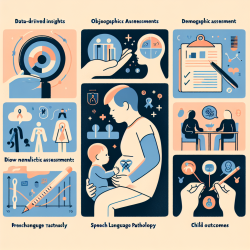In the realm of speech therapy, the use of innovative technologies can significantly enhance therapeutic outcomes. A recent study titled Effect of Voice and Articulation Parameters of a Home-Based Serious Game for Speech Therapy in Children With Articulation Disorder: Prospective Single-Arm Clinical Trial has shed light on the efficacy of home-based serious games for children with articulation disorders. The findings are promising, suggesting that such interventions can serve as a viable alternative to traditional face-to-face therapy sessions.
The study involved 13 children aged 4 to 10 years with diagnosed articulation disorders. The intervention utilized the Smart Speech program, a functional game designed to improve vocalization and articulation. Over four weeks, the children engaged in structured exercises at home, guided by their guardians and monitored by speech therapists. The results were significant, with notable improvements in both voice and articulation parameters.
Key Findings
- Maximum Phonation Time (MPT): Significant improvements were observed in MPT, indicating enhanced coordination between breathing and vocalization mechanisms.
- Articulation Parameters: Significant changes were noted in the Urimal Test of Articulation and Phonology (U-TAP) and the Three-Position Articulation Test (TA), reflecting improved consonant accuracy and articulation ability.
- Alternate Motion Evaluation (DDK): Improved articulation frequency per second for /p?t?k?/ after treatment.
These findings highlight the potential of home-based serious games to provide effective speech therapy. Such interventions offer several advantages:
- Increased accessibility for children in remote areas.
- Personalized and intensive training.
- Flexibility in scheduling and reduced stress for children.
For practitioners, incorporating home-based serious games like Smart Speech into their therapeutic repertoire could lead to better outcomes for children with articulation disorders. It is essential to consider the individual needs of each child and to ensure proper guidance and monitoring by speech therapists.
Moreover, this study opens avenues for further research. Larger sample sizes, randomized controlled trials, and long-term follow-ups are needed to validate and expand upon these findings. By embracing innovative approaches and continuing to investigate their efficacy, we can enhance the quality of speech therapy and improve the lives of children with articulation disorders.
To read the original research paper, please follow this link: Effect of Voice and Articulation Parameters of a Home-Based Serious Game for Speech Therapy in Children With Articulation Disorder: Prospective Single-Arm Clinical Trial.










